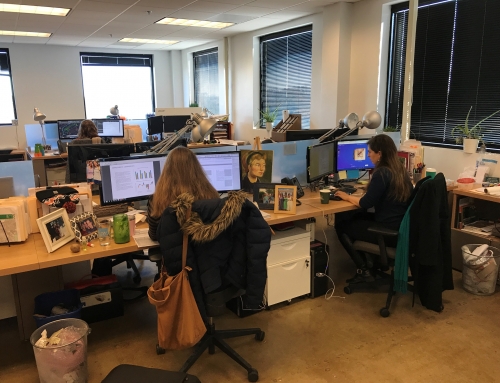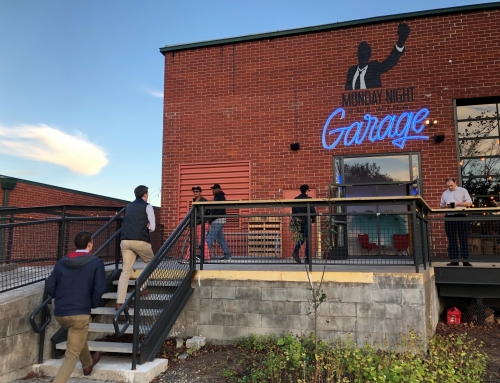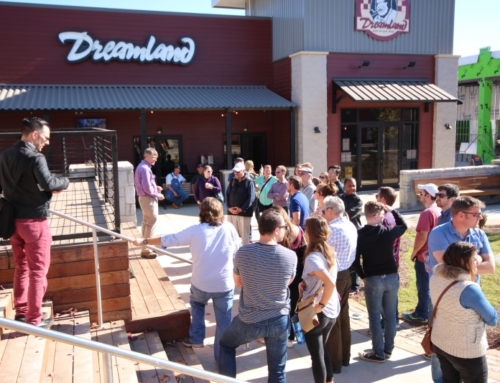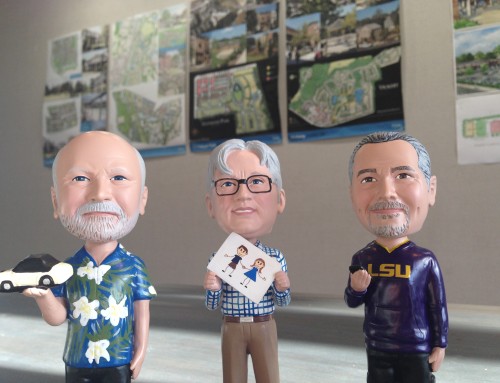The February 6, 2005, edition of Atlanta Journal-Constituion featured a profile of TSW client Emory Morsberger.
Emory Morsberger: Accidental Crusader:
Developer envisions return to Main Street
Atlanta Journal-Constitution
Walter Woods – Staff
Sunday, February 6, 2005Emory Morsberger owns what may be the most infamous piece of property in Gwinnett County, a stone Lawrenceville townhouse where almost 30 years ago a sniper waited for Larry Flynt.
He owns the second-most-infamous property, too: the low-rise building across the street where the porn publisher and his lawyer were shot and wounded.
Today, because of Morsberger, the once-vacant, slightly creepy assassin’s blind is reopening as a comfortable attorney’s office over a neighborhood cafe. Next door, there’s an ice cream parlor.
Morsberger, Gwinnett’s politician-turned-developer, is famous for his jolly roadside politicking, his booming voice and his seven daughters. Wayne Mason, a mentor, declares that Morsberger’s children stream out of the family van “like chickens.”
But he’s become a gossip topic again for quietly buying up nearly half of downtown Lawrenceville — the Flynt sites, a car lot, department stores and a 100-year-old church.
Now, not so quietly, Morsberger is scraping much of the town back to its original 1800s brickwork and plank floors, trying to make Lawrenceville into Gwinnett’s Decatur, a square of quaint shops, popular restaurants and a community theater in the old church.
Lawrenceville’s once-lively courthouse square dozed as the rest of Gwinnett prospered. County government emptied the historic courthouse in 1988 for a modern version down the road, taking the lunchtime shoppers with it.
Over the years, the landmark became surrounded by empty storefronts, used car lots and a pawnshop. But Morsberger saw its potential.
“He’s got a lot of work going on, and he’s spending a lot of money,” said an interested observer, Lawrenceville Mayor Bobby Sikes.
Morsberger is also making noise in a corner of Snellville, where the loudest sound used to be the bat cracks from the E.R. Snell ball field and the thrill of “bingo” from the Highway 78 American Legion Hall.
After a two-year political wrestling match over his 40-acre property off Highpoint Road, near the center of Snellville, Morsberger challenged the Gwinnett Board of Commissioners in court to get approval for the village-style development he wanted.
And then there’s City Hall East, Atlanta’s woolly mammoth, the largest and perhaps neediest office building in the Southeast. Morsberger and his partners last year beat out two well-connected teams for the right to salvage the 1926 former Sears building. That victory may turn out to be a classic case of “be careful what you ask for.”
Each project looks different, but in a sense they’re all the same, part of Morsberger’s mission to bring a sense of town back to sections of a metro area known for big-box parking lots and miles of cul-de-sacs.
It would be easier to build shopping centers, but consumers, even in the suburbs, are pining for an old-fashioned sense of place, of Main Street U.S.A., Morsberger said. And he’s convinced they’re willing to pay for it.
Morsberger, who’ll turn 50 this spring, insists that even in Gwinnett — where “apartment” is a slur and people want “everything nearby and nothing close” — consumers are sick of braking down U.S. 78, Jimmy Carter Boulevard and other long strips of oily parking spaces, fast-food marquees and exhausted shopping centers. (By itself, 78 has 500,000 square feet of empty or under-used retail, the equivalent of an Atlanta skyscraper.)
“People are not considering a Wal-Mart center or the Mall of Georgia to be their hometown,” he said. “People are looking for that sense of community.”
The traffic-stalled lives we live are wearing us down, he said, as people, and as a society. Case in point: It takes Morsberger a solid hour to drive from his office in a converted Lawrenceville funeral home to City Hall East. “That’s ridiculous,” he said.
As a Little League coach, “I have parents who never come to games, unless they’re on a Saturday … and they don’t sign up to coach,” he said.
Why? “Because they’re sitting on I-285,” he said. “What does that do to our quality of life?” Morsberger asked. “What does it do to us as a society?”
Developing in a different way (or “redeveloping,” a term he prefers) has become his accidental crusade — accidental, because it’s the career he picked up after success in computers and failure in politics, and a crusade because of the resistance and hassles he’s had to endure.
But Morsberger’s crusade, and his clout, reach beyond the property deeds in his pockets. His political resume and business victories have made him a political and policy player.
In January, he put together a re-election fund-raiser for Atlanta Mayor Shirley Franklin at Gwinnett’s members-only 1818 Club. (Why would a Gwinnettian help re-elect Atlanta’s mayor? “Because as Atlanta goes, so goes Gwinnett,” Morsberger said.)
He’s also steering a long-awaited report on development for the Gwinnett Board of Commissioners. Newly elected Chairman Charles Bannister has a copy on his desk; the public will hear the final version in March.
The preliminary report, which took two years, recommends bringing dense, Midtown- and Decatur-style developments (minus apartments, importantly) to Gwinnett’s blighted areas, namely Jimmy Carter Boulevard, Gwinnett Place mall and U.S. 78.
The Gwinnett County Revitalization Task Force, which Morsberger chairs, wants the county to smooth rezoning and even give tax incentives to developers who’ll buy up, demolish and redevelop those districts’ many failed shopping centers.
It’s an idea who’s time has come, Wayne Mason said. “Revitalization in Gwinnett? I’m one of the preachers,” he said. Such districts are “like a sore — if you don’t treat it, it gets big.”
Similar redevelopments, often called “new urbanism, new urbanist, ” are being tested at unwanted retail or industrial sites around the country, including metro Atlanta. Think Atlantic Station.
New sheriff in town
Lawrenceville, Gwinnett’s county seat, had long been a sore spot before Morsberger took an interest, Mason said. Years back, Mason tried to buy up parts of the town and bring in new businesses himself. But the attitudes were “backwoods” then, he said. Few property owners were interested in selling, and he gave up.
“But he’s done more to Lawrenceville than I ever thought he could,” Mason said of Morsberger. “If you could resurrect the dead, they’d think it was the 1920s down there.”
Morsberger, like a 1920s town sheriff, has keys to much of the city. On a walking tour last month, he unlatched the glass doors of the restaurants, shops, offices and even a bar (yes, Lawrenceville is wet) that he’ll open this year. Many of them have his now-trademark “Progress Coming” signs posted in the windows.
On New Year’s Eve, he helped pay for a city fireworks celebration around the 1885 courthouse that drew 8,000 people. He’s also nudged the city to build a parking deck for his future customers. And there’s even talk of condos in both new and renovated structures in the not-so-distant future.
Not everyone is thrilled. One car dealer who has since moved out briefly used his marquee to question if “progress” meant one man owned the whole town.
But Mayor Sikes believes people want to see Lawrenceville change. “It’s different for Lawrenceville, but it’s going to be great,” he said.
Beating the naysayers
Morsberger moved his offices to Lawrenceville last year, but some of his first trials with Gwinnett real estate were in Snellville.
Fresh from a disappointing run for Congress in 1992 — he lost to U.S. Rep. John Linder — Morsberger turned his attention to a sad cluster of townhouses off U.S. 78.
He bought the units, some with cars resting on cinder blocks in the front yards, and gradually fixed them up, Mason remembered. Everything he touched turned around, Mason said. “I was amazed, and it paid off for him.”
Eventually, he bought some acres on the other side of the highway, and in 2003 he approached the county about building Mountain View Village, a mixed-use center of offices and houses, parks and retail.
His project, only the second to test Gwinnett’s then-new mixed-use zoning category, may have been ahead of its time, said Brett Harrell, executive director of the Highway 78 Community Improvement District, a group Morsberger helped start.
“A number of people are naysayers about mixed use” in Gwinnett, Harrell said. The attitude was, “no one’s going to live over a store, or walk to a store,” he said. Morsberger is certain they will.
But his project came up during an election year roiled with concern about development, Harrell pointed out. Personalities and politics flared.
Gwinnett’s commissioners shot down the project in 2003, and again in June, citing school overcrowding. Morsberger appealed to Superior Court.
By December, tempers had cooled — and the polls had closed — and the commissioners approved Mountain View Village.
Slow go in Atlanta
With City Hall East, Morsberger could be years from a happy ending. The immense building, more than 2 million square feet, is sagging and tainted with lead and asbestos. The city’s fire, police and 911 call center departments are housed there and must relocate before the renovations can begin.
Morsberger and his team — Lane Co., Integral Group and Adams & Co. Real Estate, among others — plan to convert City Hall East into a 1,300-unit condo and apartment community with small offices, stores and cafes on both Ponce de Leon and North avenues.
Though the team won the city’s bidding process last year, the Atlanta City Council has yet to approve a contract with Morsberger’s partners. Plus, the city is considering whether to build a new headquarters for the police department, which could delay City Hall East’s conversion for years.
But the team is convinced City Hall East will draw consumers, and in the end will be worth untangling the red tape.
“When you do a project like this, you create a market that is not obvious to the uninformed observer,” said Egbert Perry, chief executive officer at Integral Group, one of the partners. “The reality is, when you create housing choice with amenities in the city center, you create a market for people in
[areas like] Alpharetta … to live closer to where they work.”Morsberger, even sitting in a dirty break room in City Hall East, is unflappably upbeat. It’s something he’s become known for, a tireless, almost steely, positivism.
His response to most questions is “incredible,” not in the sense of “implausible,” but in the sense of “astonishing.”
He’s so certain of his developments, that “for him it’s a reality before it’s a reality,” said Harrell, of the Highway 78 Community Improvement District.
“He speaks of things as if things are done.”





